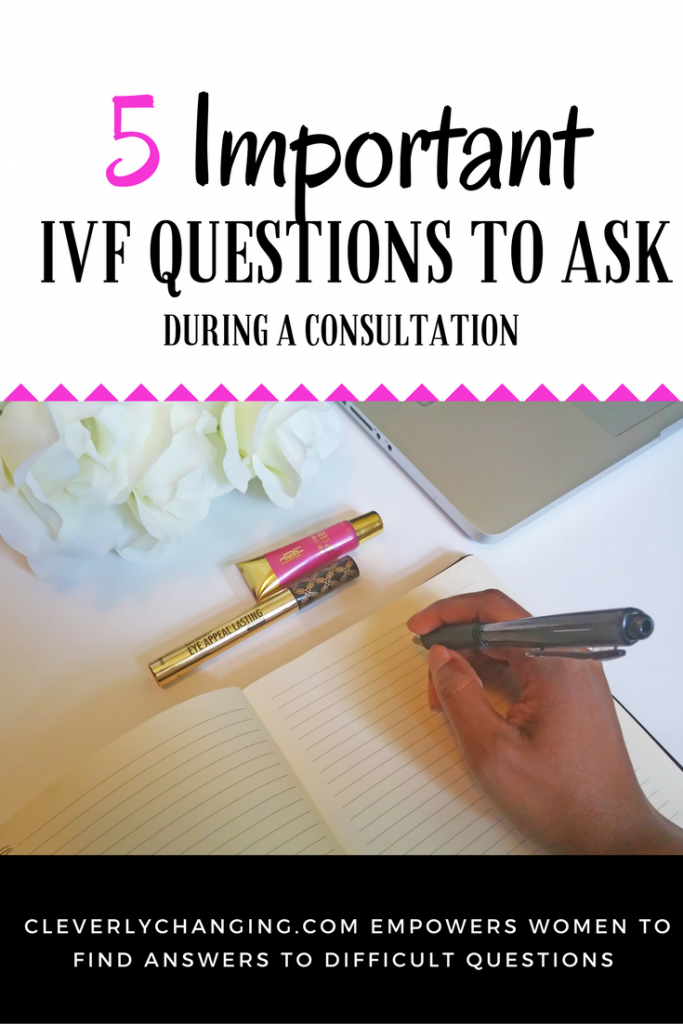The ability to conceive is a delicate topic. It’s one that many women have in closed circuits and may not be willing to speak about publicly. One of my goals on Cleverly Changing is to help families have open and honest dialogs about complex subjects and receive information that is accurate and helpful. Today’s topic, although sensitive, is close to my heart. As a result, I want to share the questions you should ask during an IVF consultation, just in case you weren’t sure where to get started in the process. My first encounter with how IVF affects individuals their families was on my first job. One of my colleagues and his wife had undergone several IVF treatments so she could have his child. The stress of the treatments and hormonal roller-coaster was felt in the entire office. Observing their experience confirmed the importance of having a solid support system to help both parties cope with the experience. Hence, the person receiving treatment and their partner will need their friends and family more than ever.
In vitro fertilization is a very good option for individuals and couples who are, for whatever reason, unable to have biological children. In some cases, IVF might be the only option. The procedure has been around for decades, but even still, many people are completely unfamiliar with the process.
While it’s not a substitute for solid direction from the IVF doctor, this IVF consultation guide should serve as a starting point for this conversation to take place. The answers to many of these questions may be found on the organization’s website, so patients can arm themselves with information.
Here are the top questions to ask during an IVF consultation

What Types of IVF Do You Offer?
This procedure is not one size fits all. Instead, there are a number of different options available to suit different needs. Most larger IVF clinics offer all three major types, which are:
- Natural: Instead of artificially stimulating the mother’s ovary to produce a number of eggs, the doctor harvests the one egg that the mother naturally produces and then combines it with sperm from the donor. This method has the fewest surgical risks and the lowest success rate.
- Mild: Low-dose hormones create more than one egg, but there is very little risk of ovarian hyperstimulation. There are fewer eggs per treatment, but the patient can undergo mild IVF more frequently, so the number of eggs evens out. In fact, according to some statistics, mild IVF is almost as effective as standard IVF or IVM.
- IVF: This procedure involves higher hormone doses that produce more eggs and therefore give doctors a better choice of which one to fertilize. The tradeoff is that this process carries a great risk of ovarian hyperstimulation, and in some cases, this condition is potentially fatal.
- IMF: Standard in vitro fertilization is also very expensive. As an alternative, some people turn to in vitro maturation. Doctors collect immature eggs, grow them in the laboratory, and then fertilize them. Since IVM is a rather delicate procedure, only patients who fit certain profiles in terms of age and health are good IVM candidates.
Most larger clinics offer all four types, but many of these places truly focus only on one or two.
How Do You Determine The Best Treatment?
There’s really only one acceptable answer to this question. The type of treatment should be a collaborative decision between doctor and patient. The patient provides necessary information and talks about goals for the process, and the doctor matches the patient’s complete profile to a type of IVF treatment.
What is the Cost?
The clinic should be completely transparent and not charge hidden costs. Remember, price is almost always negotiable, so do not be afraid to engage in negotiations. A firm “no” is the worst thing that can happen.
[clickToTweet tweet=”Considering #IVF? Pls note: the clinic should be completely transparent and not charge hidden costs. #womenshealth” quote=”Tweet this: Considering IVF? Pls note: the clinic should be completely transparent and not charge hidden costs.” theme=”style5″]
Is There a Waiting List?
This is a loaded question. If the clinic offers a good experience and has a high success rate, it will be a popular place and it may not be possible to begin treatments immediately. If your first IVF session can be the next afternoon, that may be a bad sign.
Why Is Your Success Rate Higher/Lower Than Other Clinics?
You expect the doctor to listen to you. At this point, it’s your turn to listen to the doctor. Be wary of responses that subtly shift blame onto the patients. Instead, the clinic should offer a clear explanation as to why their process is different and why they follow those certain procedures.
Reader Question:
I’ve shared the top questions to ask during an IVF consultation, what are some other questions you have about IVF?
Also read:
- What to Expect When Having Your First Child
- Health Problems and Pregnancy: Work Closely With Your Doctor


